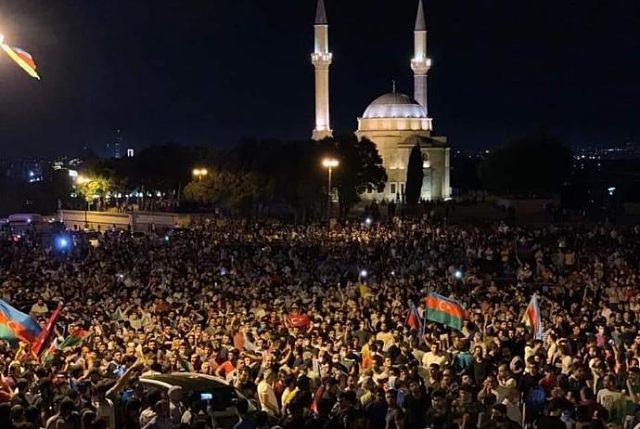Azerbaijan has risen after the killing of its military personnel (soldiers) by the terrorist formations of the so-called Nagorno-Karabakh Republic: Major General Polad Hashimov, Chief of Staff of the 3rd Army Corps of the Armed Forces of Azerbaijan, Colonel Ilgar Mirzoyev, Artillery Commander of the 3rd Corps, Majors Namig Ahmedov and Anar Novruzov, Warrant Officers Ilgar Zeynalov and Yashar Babaev and Private Elchin Mustafazade. The soldiers were killed in fighting with Armenian occupation forces near Tovuz (https://golosislama.com/news.php?id=38931).
After that, tens of thousands of Azerbaijanis, carrying national flags, poured into the streets of the cities and villages of the republic for mourning ceremonies, which turned into spontaneous protest rallies against the inaction of the authorities and with calls for the de-occupation of Nagorno-Karabakh. The demonstrators in Baku managed to enter the building of the National Parliament, but then the police began to disperse them by force.
It should be noted that earlier the Chief of the Turkish General Staff Hulusi Akar and the President of Turkey Recep Tayyip Erdogan expressed words of support for the fraternal people of Azerbaijan and warnings to Armenia, which is conducting a provocative policy.
What is happening now in the long-frozen but beginning to thaw zone of the Azerbaijani-Armenian conflict? Is it a spontaneous escalation due to military actions, as often happens in cases like the Pakistan-India conflict? Or is it a deliberate political provocation?
Turkish analyst Abdullah Adjar highlights the fact that the provocative actions of the Armenian soldiers firstly began immediately after Turkey’s decision to convert Hagia Sophia into a mosque, and secondly took place in an area through which oil and gas pipelines to Turkey pass via a new transit route. According to him, Yerevan is not acting independently, but following the instructions of external centers.
On the other hand, a number of other analysts believe that the initiative to escalate the conflict came from Yerevan itself and is explained by the attempt of the current authorities to divert the attention of the Armenian society from the escalating coronavirus and political crises in the country. They also point out that it happened shortly after the demobilization of the son of the Armenian leader Nikol Pashinyan, who served at the front.
Either way, the question that Azerbaijani society poses to the country’s leadership is becoming increasingly relevant. Specifically, how much longer will Azerbaijan, with its oil resources and a population three times larger than Armenia’s, tolerate the occupation of about 25% of its territory by Armenia, which is in economic and demographic decline?
Of course, this problem cannot be solved emotionally. Now is not the time for revolutionary armies, and people who want to go straight from a rally to war can only become cannon fodder in its mills. Moreover, it is not necessarily a one-time full-scale war between two states, which would automatically involve their external patrons, as the provocateurs of this war may hope.
However, the Azerbaijani military and political leadership could learn from the advanced experience of conducting asymmetric military operations of their Turkish brothers, who managed to effectively turn the tide of the war in Libya using the latest military technologies. The Azerbaijani armed forces, acting step by step, could begin to regain control over their internationally recognized territory piece by piece and force the separatists and occupiers into serious negotiations for the beginning of peaceful reintegration.
Today, this does not require a general mobilization, but an effective army and a state run by a leadership that sets strategic goals and has the will to implement them step by step. Azerbaijan can solve the Karabakh problem only if it has the means to do so.

